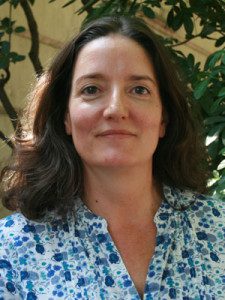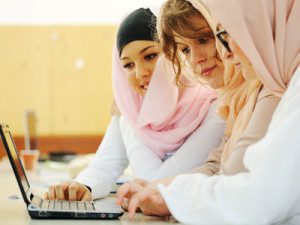Anna Searle is the British Council’s Director of English Language and she has been in this role since 2013. Prior to this she held various global and country roles with the British Council and has lived and worked in eight different countries over the last 20 years.

“…Female students on the course currently outnumber male students by more than two to one. At this stage in the course, we are not sure why we have seen such a high take up from women, although we are delighted to see such strong participation…”
Please can you tell us a bit about the British Council and its objectives?
The British Council is the UK’s international organisation for educational opportunities and cultural relations. In our work across English, the arts and education, we aim to create international opportunities for the people of the UK and other countries in order to build trust between them worldwide.
As one of the UK’s greatest assets, the English language has a central role in building the UK’s international cultural relations so our work in English aims to bring high quality language materials to every learner and teacher who wants them.
We currently teach English in more than 80 countries and in developing and post-conflict countries we teach English and train teachers through innovative methods including radio, the internet and mobile technology.
English is a language of opportunity and so we want to share our expertise in teaching it, something we have been doing for 80 years, with the world.
What is a MOOC?
A MOOC, which stands for ‘Massive Open Online Course’, is a free online course which can have an unlimited number of users. The ‘Exploring English’ course is being delivered on FutureLearn, a social learning platform, a UK-based provider of MOOCs from some of the world’s leading universities and cultural bodies like the British Council, British Library and British Museum.
Please can you tell us about the new course and how it came about?

“Exploring English” is a free six week course which is aimed at intermediate-level English speakers and uses a mixture of videos, short quizzes and discussions to introduce learning items not just related to the English language, but also to British culture.
All the videos were shot in the UK and represent authentic examples of people speaking English in every day settings. The course gives learners from all over the world the chance to interact with each other while developing their English vocabulary, reading and writing skills. Teachers and course moderators have direct contact with students, creating one big global classroom.
We were very keen to develop a free online course to support English language learning because we were confident this would have wide appeal for fans of massive open online courses or MOOCs, some of whom are studying for work or for education, whilst others are studying for leisure.
English is increasingly important in all these areas, wherever you are in the world. Combining English language with culture was a natural area for us to focus on given our role as a cultural relations organisation and experts in English language teaching.
We are really pleased to see how MOOC learners are enjoying interacting with each other online to discuss their experiences of language learning and culture, whether comparing their musical preferences or discussing their local environment. Working with FutureLearn and through use of the social learning tools on the FutureLearn platform, we were able to add a new angle to our existing English language online learning offers, and to reach new audiences.
What has the uptake been like? Which countries have seen most uptake?
The uptake has been phenomenal! More than 110,000 people have signed up for the course with over a third of students choosing to follow the course via their mobile phones. 55% of the people who signed up have now actually started the course, and it’s great to see the level of interest, but also the level of engagement with the social learning platform – over 200,000 comments since the course started!
We have students taking part from 178 countries including Algeria, Burma and Russia. The single biggest group of students is from Spain but we also have large groups of students from Colombia, China, Vietnam and India. Interestingly, the UK is in the top 10 as well.
What is the gender split of course participants? Why are so many women taking part? Did you actively target them?
Female students on the course currently outnumber male students by more than two to one. At this stage in the course, we are not sure why we have seen such a high take up from women, although we are delighted to see such strong participation.
Whilst we didn’t actively target women, it is absolutely fantastic that so many are taking part, and interestingly it seems to support the trend of when MOOCs first started the majority of learners were male and had degrees, but this seems to be changing fast and now around 60% of FutureLearn learners are women and 25% of them don’t already have degrees.
Do you envisage more MOOCs in the future?
The success of the current MOOC has really inspired us to do more and we are already developing a MOOC in partnership with University of Southampton, which is scheduled to start on 17 November and run for four weeks.
The MOOC, called “Understanding Language: Learning and Teaching” is aimed at teachers of English and will introduce them to some of the key concepts in the effective teaching and learning of languages, including the use of technology in teaching, and its benefits and challenges for language learning.
http://www.britishcouncil.org/
https://twitter.com/BritishCouncil
https://uk.linkedin.com/company/british-council
https://www.facebook.com/britishcouncil





